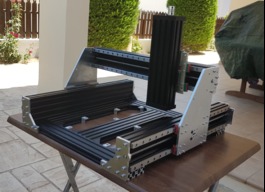Sphinx 55 on MGN12 linear rails
Discussion in 'CNC Mills/Routers' started by SORIN ILIESCU, Sep 2, 2019.
Sphinx 55 on MGN12 linear rails
Discussion in 'CNC Mills/Routers' started by SORIN ILIESCU, Sep 2, 2019.
My machine is a combination of the Openbuilds Sphinx 55, MGN12 linear rails knockoffs and custom made plates made by Chris Laidlaw
Page 2 of 2
Page 2 of 2
